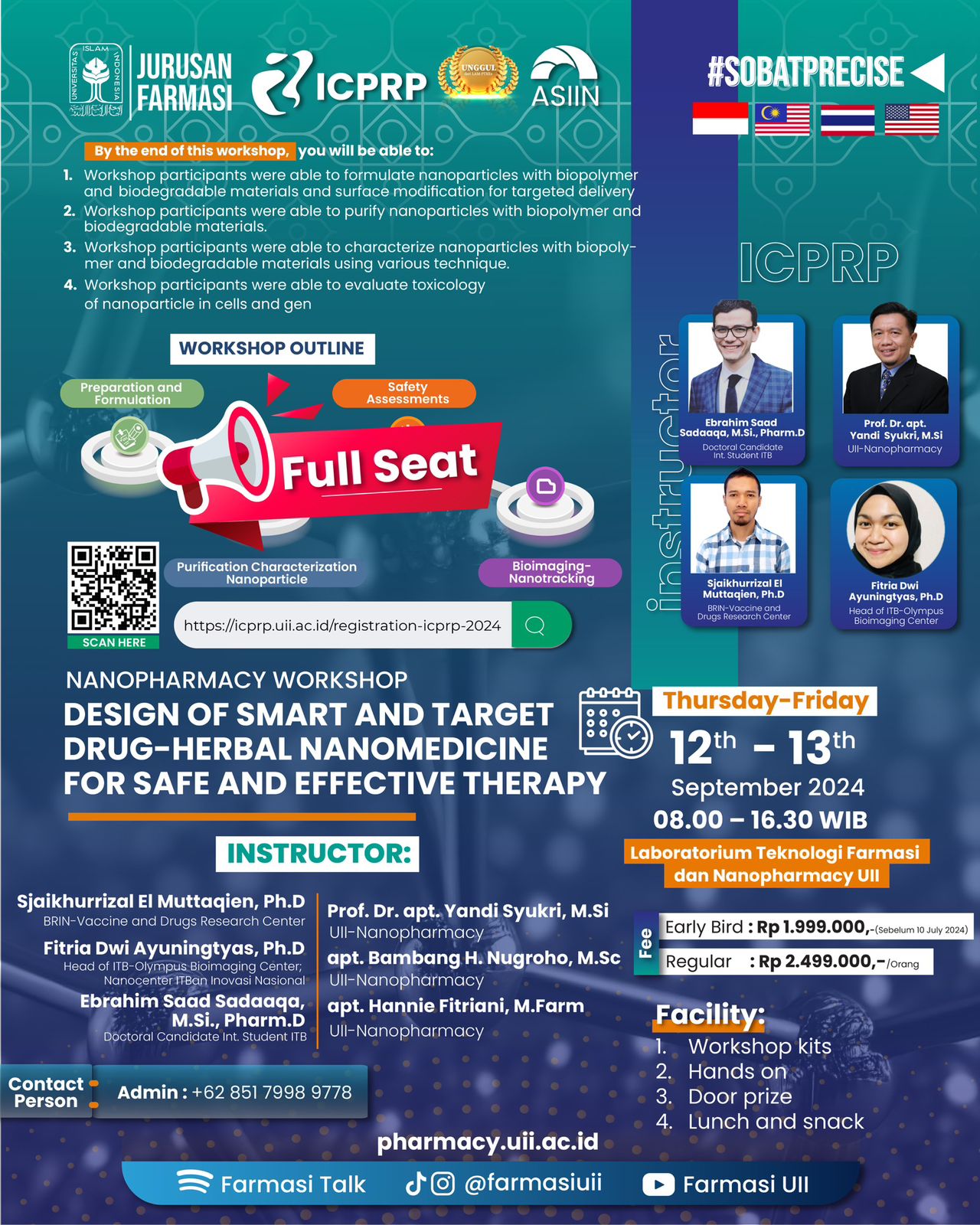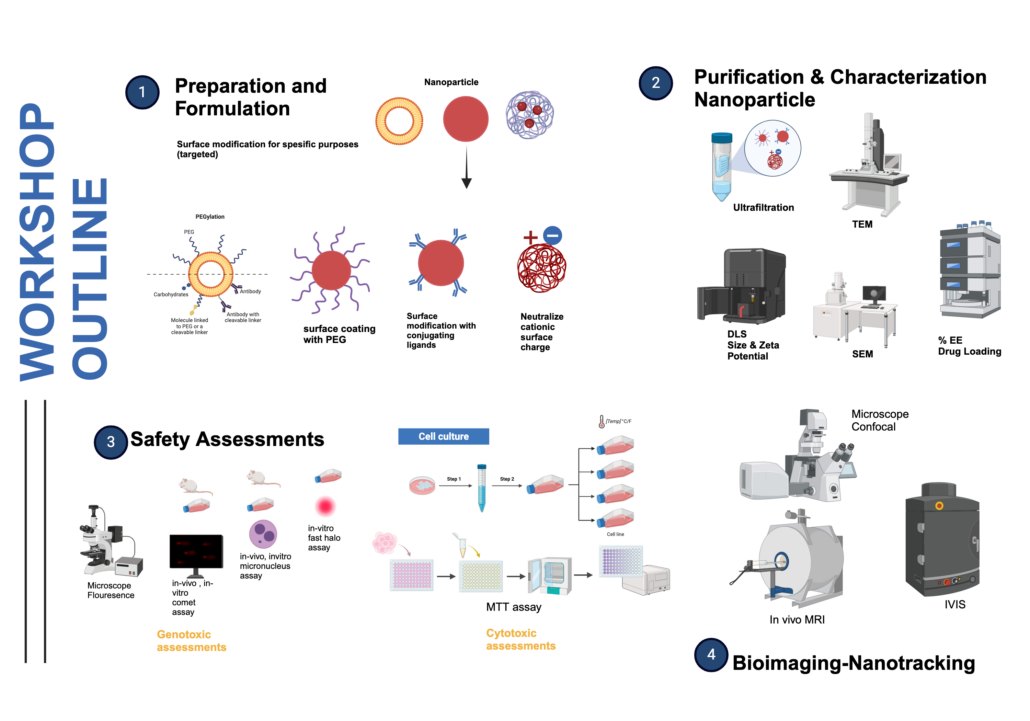
==================
NANOPHARMACY WORKSHOP
“Design of Smart and Targeted Drug-Herbal Nanomedicine for Safe and Effective Therapy”
Instructor:
1. Sjaikhurrizal El Muttaqien, Ph.D. (BRIN – Vaccine and Drugs Research Center)
2. Fitria Dwi Ayuningtyas, Ph.D. (Head of ITB-Olympus Bioimaging Center; Nanocenter
ITB)
3. Ebrahim Saad Sadaaqa, M.Si., Pharm.D. (Doctoral Candidate Int. Student ITB)
4. Prof. Dr. apt. Yandi Syukri, M.Si. (UII-Nanopharmacy)
5. apt. Bambang H. Nugroho M.Sc. (UII-Nanopharmacy)
6. apt. Hannie Fitriani, M.Farm. (UII-Nanopharmacy)
Background
Nanotechnology has revolutionized the development of safe, convenient, effective, and targeted drug delivery systems. Nanoparticles, due to their unique physicochemical properties, are ideal candidates for drug delivery due to their ability to enhance bioavailability and targeted delivery. These formulations incorporate controlled release profiles, increased solubility, and improved stability. Biopolymers and materials categorized as Generally Recognized as Safe (GRAS) are particularly attractive for developing biocompatible and safe nanoparticles. Examples include polymers derived from seaweed and marine animal shells. Lipids and phospholipids, abundant and renewable, are also used in nanoparticle formulations due to their inherent safety and effectiveness. Extensive research and development have been devoted to formulations such as liposomes, noisome, phytosomes, and lipid-based systems. PLGA (polylactic-co-glycolic acid) stands out for its promising application for lipophilic drug delivery. Despite the challenges of high purity and variability in these materials, recent technological advancements have addressed these issues, enabling effective and efficient targeted drug delivery through nanoparticle formulations.
Goal and Outcomes
- Workshop participants were able to formulate nanoparticles with biopolymer and biodegradable materials and surface modification for targeted delivery
- Workshop participants were able to purify nanoparticles with biopolymer and biodegradable materials.
- Workshop participants were able to characterize nanoparticles with biopolymer and biodegradable materials using various technique.
- Workshop participants were able to evaluate toxicology of nanoparticle in cells and gen.
- Workshop participants were able to understand various bioimaging technique
(nanoparticle tracking).
| Day 1 (Online) | |
| 07.45-08.00 | Registration |
| 08.01-08.10 | Welcome address (Dean Faculty of Math and Science) |
| 08.11-08.50 | “Basic Technique Confocal Laser Scanning Microscopy for Life Science”
Head of ITB-Olympus Bioimaging Center, PPNN ITB, Fitria Dwi Ayuningtyas, Ph.D |
| 08.51-09.30 | “Development of Nano-herbal from Natural Bioactive”, UII Nanopharmacy Research Centre, Prof. Dr. apt Yandi Syukri, M.Si |
| 09.30-10.15 | “Bioimaging Technique Confocal Laser Scanning Microscopy for Targeted Nanoparticle Drug Delivery”.
International Student Ganesa Talent Award, Doctoral Candidate Sekolah Farmasi ITB, Ebrahim Saad Sadaaqa, Pharm.D (Egypt) |
| 10.16-10.30 | “Introduction of IVIS Imaging System and Preparation of Sensitive and Targeted Nano-Biosensor for Detection of Infectious Disease”, BRIN, Sjaikhurrizal El Muttaqien, Ph.D |
| 10.31-11.15 | 1. Basic and hybrid nanoparticle for drug delivery in the Workshop Program
2. Technical meeting for 2 days hand on workshop Nanopharmacy Research Centre, apt. Bambang Hernawan Nugroho, M.Sc. |
| 11.16-11.50 | QnA |
| 11.50-12.00 | Closing and Doorprize |
| Day 2 (Offline) | |
| 07.45-08.30 | Registration |
| 08.31-09.00 | Welcome address (Dean Faculty of Math and Science) |
| 09.01-09.30 | Topic 1- Formulation of Liposome Surface Modification for Targeted Therapy |
| 09.31-10.30 | Topic 2- Formulation of PLGA Surface Modification for Drug Delivery and Targeted Therapy |
| 10.31-10.45 | Coffee Break |
| 10.30-12.15 | Working Formulation Liposome and PLGA Modification (Hand on) |
| 12.15-13.00 | Break and Lunch |
| 13.00-15.15 | Characterization of Formulation Liposome and PLGA (Hand on) |
| 15.15-15.30 | Coffee Break |
| 15.31-16.30 | Characterization of Formulation Liposome and PLGA (Hand on) |
| 16.31- | Closing day 1 |
| Day 3 (Offline) | |
| 07.30-08.00 | Coffee break |
| 08.01-12.15 | Topic 3- Commet assay with fluorescence-confocal microscope (In vitro) |
| 12.15-13.00 | Break and Lunch |
| 13.01-15.15 | Topic 4- Fast halo assay with fluorescence-confocal microscope (In vitro) |
| 15.15-15.30 | Coffee Break |
| 15.31-16.30 | Data review |
| 16.31- | Closing and Certificate |
*Tentative

